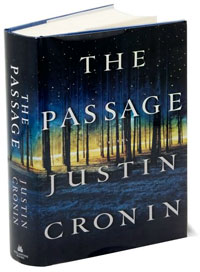My State-by-State Tour of Public Radio Continues!
 You may recall that, earlier this month, I appeared on Minnesota Public Radio to refute some nonsense Garrison Keillor was spouting about the imminent decline of publishing. Well, late last week I did a pre-recorded interview with New Hampshire Public Radio, specifically the show “Word of Mouth,” fielding questions about the history behind the acquisition of The Passage, the new Justin Cronin novel upon which Ballantine has placed blockbuster hopes, and the magnitude of the marketing campaign to launch that novel into the world. That segment aired Monday, with my comments used primarily as a setup for a more extensive interview with Cronin, during which he acquits himself quite nicely.
You may recall that, earlier this month, I appeared on Minnesota Public Radio to refute some nonsense Garrison Keillor was spouting about the imminent decline of publishing. Well, late last week I did a pre-recorded interview with New Hampshire Public Radio, specifically the show “Word of Mouth,” fielding questions about the history behind the acquisition of The Passage, the new Justin Cronin novel upon which Ballantine has placed blockbuster hopes, and the magnitude of the marketing campaign to launch that novel into the world. That segment aired Monday, with my comments used primarily as a setup for a more extensive interview with Cronin, during which he acquits himself quite nicely.
I had barely gotten 100 pages into The Passage when we did that interview last Friday, and over the weekend I was able to get another couple hundred in, but I’m still only at about the halfway point. So far, there’s a lot to like about the novel—compared to Mira Grant’s Feed, another recent brick-sized first-volume-in-a-trilogy about what happens to American society after scientific experiments lead to a plague of bloodsucking fiends, The Passage is by all means more elegant, and less overtly didactic (or, in some instances, less blatantly satirical). Then again, the plot of Feed is more tightly compressed, and though both novels thrive on hiding some important information until absolutely necessary, so far The Passage is requiring a greater suspension of disbelief. Further, one of the most significant stumbling blocks I’ve had in getting into The Passage is an abrupt shift of narrative focus as a story that starts out echoing the best storytelling of Stephen King suddenly jumps into Walter F. Miller, Jr., territory. (And that’s not just me making stuff up: Cronin has acknowledged the influence of A Canticle for Liebowitz on his post-apocalyptic worldbuilding.) But that could just be on me; I made the effort to adjust to the new setting, and I’m eager to see where The Passage goes from there.
Meanwhile, if there are any other public radio programmers/producers who are looking for somebody to talk about literature or publishing, heck, I’m available, and I wouldn’t mind hitting all 50 states by next June.
22 June 2010 | uncategorized |
Professional & Ethics in Blogging, Round 2
It’s been a few weeks since my Book Blogger Convention talk on professionalism and ethics for book bloggers, but I am still seeing new responses—earlier today, I found a particularly thoughtful critique by Jessica, a philosophy professor specializing in ethics that zeroed in on a few areas where, in reviewing the video, I recognized a need to tighten up my presentation, as well as a few spots that I had missed. I’m not going to touch on all of them in this post, I suspect, but I did want to get some thoughts down.
Jessica notes that the stylistic lines between “professional” literary critics and “unprofessional” book bloggers are not clear-cut; bloggers often engage in “objectivity-enhancing practices” such as not reviewing friends’ books, for example, and mainstream literary criticism is, ultimately, subjective. It reminded me of a point that came up in an interview I did a few years back about the philosophy of wine: “On the one hand, we insist that it’s all subjective,” I wrote after my conversation with Barry Smith. “But, if so, what’s the point of any wine criticism, let alone the attempt to establish standard rankings? Wouldn’t complete subjectivity reduce criticism to autobiography? (I immediately think of useful parallels that might be drawn to literary criticism.)”
That’s not a question that can be resolved very easily; I only want to point out for now that if the line of demarcation between the professional and unprofessional “writing about books” were essentially stylistic, it might also be arbitrary, with attempts by professionals to suppress the proliferation of “unprofessional” writing, or at the very least its influence, stemming from highly vested self-interests—which circles back to my point that “professionals” set up the standard of what is real/valid in order to validate their own reality and deny power to others.
19 June 2010 | uncategorized |

 Our Endless and Proper Work is my new book with Belt Publishing about starting (and sticking to) a productive writing practice.
Our Endless and Proper Work is my new book with Belt Publishing about starting (and sticking to) a productive writing practice. 
